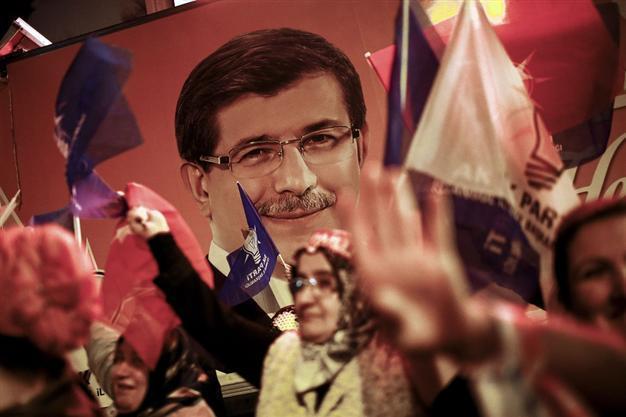Four reasons why the AKP won the Nov 1 elections by a landslide
Nuray Babacan

Supporter of the Justice and Development Party, (AKP), backdropped by a poster of Turkish Prime Minister and party's leader Ahmet Davutoğlu, wave flags as they celebrate outside the AKP headquarters, in Istanbul, Turkey, late Sunday, Nov. 1, 2015. AP Photo
A number of factors come to the fore in analyses explaining what had changed since the June 7 elections which helped the AKP regain enough seats for single-party rule. Here are four reasons why the AKP garnered more than four million additional votes at the expense of the opposition parties.1. Bahçeli’s negative attitude
The Nationalist Movement Party (MHP) base did not support the negative attitude of its leader, Devlet Bahçeli, especially during the coalition talks with the AKP.
Bahçeli drew criticism from the party’s supporters for declining the Justice and Development Party’s (AKP) offer to share power, despite the fact that single-party rule is impossible considering the level of support the MHP manages to garner.
Citizens who had voted for the MHP in the June 7 elections voted for the AKP instead this time around, as they considered the latter to be closest to their preferences. As a result, these voters contributed to the AKP’s victory.
2. The escalation of terror attacks by the PKK and ISIL
The escalation of terror attacks by the outlawed Kurdistan Workers’ Party (PKK) and the jihadist Islamic State of Iraq and the Levant (ISIL) played to fears of a return to Turkey’s recent history marked with violence and instability.
Rising terrorism also created the perception that only a strong and stable government could cope with such attacks.
The failure of the Kurdish problem-focused Peoples’ Democratic Party (HDP) to take a firm stand against PKK terror also influenced voter decisions.
3. Rise in economic promises
The AKP benefited from focusing its rhetoric on the economy, as opposed to its politics-centered campaign strategy ahead of the June 7 elections.
Economic promises, especially those targeting retirees and low-income citizens, proved fruitful.
Considering the AKP’s level of support, the electorate decided the AKP had the highest likelihood of delivering economic promises and cast their votes accordingly.
4. Change in candidate lists
The AKP drew lessons from the results of the June 7 elections and redrafted candidate lists in accordance with the people’s demands.
The intervention of President Recep Tayyip Erdoğan in the AKP congress had a positive impact on the electorate, confirming the ongoing influence of Erdoğan on the AKP and reinforcing the sensation of a strong party.
















